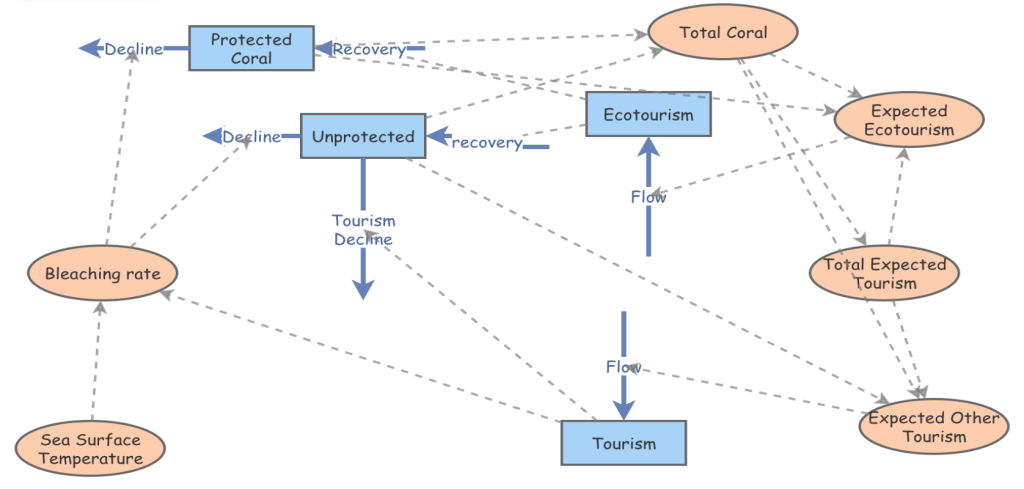This semester, I taught an amazing new version of a class on “Coupling Human to Natural Systems”. The goal of the class is to understand how social systems and environmental systems impact one another and co-evolve. To do so, the class provides a broad introduction to system dynamics, and the students get to develop their own group projects.
The resulting projects were excellent, with an analysis of real-world issues by developing sophisticated coupled models. Below are a summaries of a couple of the group projects.
Offshore Wind and North Atlantic Right Whales: Modeling an Uncertain Interaction
Authors: Lorren Ruscetta, Emma Korein & Laura Taylor

Abstract: Amidst the ambitious US goal to deploy 30 gigawatts of offshore wind energy by 2030, concerns about the environmental impact on marine life, particularly the North Atlantic right whale (NARW), a vulnerable species under the Endangered Species Act, have become prevalent. This study focuses on the proposed Ocean Wind 1 project off the coast of New Jersey and its potential impacts on NARW populations, balancing the deployment of 98 planned turbines with stakeholder support dynamics. Utilizing an integrated model that considers factors such as noise pollution, vessel collisions, artificial reef benefits, and stakeholder support, the research explores the influence of offshore wind infrastructure on NARW populations and the extent of the project’s realization.
The model outcomes indicate that while NARW populations may not face significant decline due to the wind project, stakeholder support is sensitive to whale mortalities associated with turbine construction. Simulations predict that despite the initial aim, only 36 out of 98 turbines would be constructed due to stakeholder opposition following 1.6 NARW deaths. Sensitivity analyses further reveal the robustness of NARW populations under various scenarios but consistently suggest fewer turbines than anticipated will be erected, highlighting stakeholder perception as a crucial factor in determining the project’s scale. Consequently, the model provides policy insights and underscores the need for careful consideration of both marine conservation and stakeholder concerns in executing offshore wind projects.
Keywords: Offshore wind energy, North Atlantic right whale, stakeholder support, marine conservation, environmental impact modeling.
Impact of Ecotourism on Florida Keys Coral Reefs
Authors: Christina Marchak, Travis Pluck & Yuleny Gomez Rodriguez

Abstract: Coral reefs, such as those in the Florida Keys, offer critical ecosystem services and serve as a hub for tourism and ecotourism. However, they face threats from climate-related factors like rising sea surface temperatures (SST) leading to coral bleaching, and from socioeconomic activities. This paper explores the dynamics between ecotourism, SST, and coral reef health. A dynamic coupled system model is developed to analyze the impacts of human activities (ecotourism and normal tourism) on the health and cover of coral reefs, using the representative coral species Acropora palmata. The model integrates variables like tourism revenue, bleaching rate due to SST, and coral recovery rate. The study found that ecotourism and normal tourism, affected by SST, influence coral health and cover. Higher SST was linked to increased bleaching rates and reduced coral cover. Conversely, appropriate levels of ecotourism funding can mitigate these effects through conservation efforts such as coral seeding, creating a positive feedback loop for coral cover. The model revealed thresholds of coral decline that affect tourism and showed both declines and stabilization scenarios in the presence of varying levels of ecotourism intervention. The research provides critical insights for policymakers and stakeholders to consider the balance between tourism and coral conservation in the Florida Keys. It suggests that directing resources from ecotourism revenue towards restoration and conservation strategies may help sustain these vital ecosystems.
Keywords: Coral reefs, ecotourism, sea surface temperature, bleaching, conservation, tourism revenue, dynamic coupled system model.

0 responses so far ↓
There are no comments yet...Kick things off by filling out the form below.